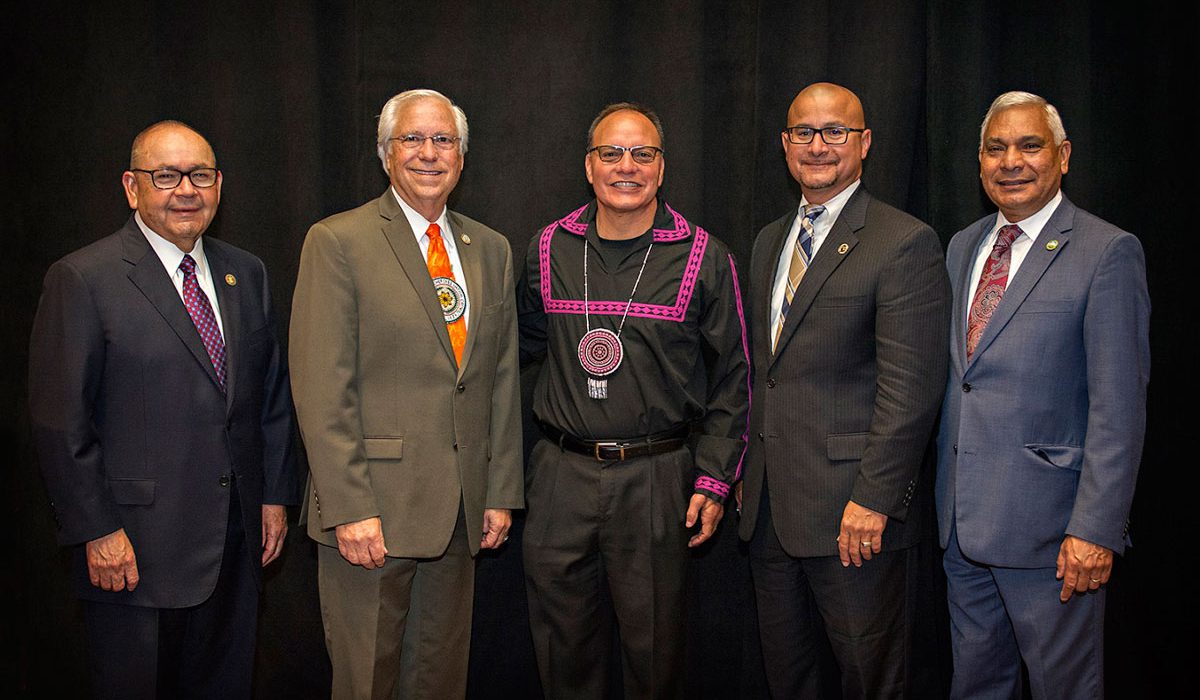Housing, health, languages prompt Five Civilized Tribes to action
Leaders of the Five Civilized Tribes include, from left to right, Chickasaw Nation Gov. Bill Anoatubby, Cherokee Principal Chief Bill John Baker, Choctaw Nation Chief Gary Batton, Seminole Nation Chief Greg Chilcoat and Muscogee (Creek) Principal Chief James Floyd. They met in Durant at the Choctaw Casino & Resort Friday, Oct. 12. Photo by Deidre Elrod / Choctaw Nation.
Choctaw Nation
Charlie Clark
DURANT – The Inter-Tribal Council (ITC) of the Five Civilized Tribes faced a light action agenda at its final 2018 quarterly meeting. The council is comprised of leaders of the Chickasaw, Cherokee, Choctaw, Muscogee (Creek) and Seminole nations. They represent 750,000 Native Americans. Three resolutions passed unanimously by voting delegates of the five tribes. They include:
·. Each is entitled to full federal funding under the 1975 Indian Self-Determination and Education Assistance Act. Additionally, tribes are reimbursed for inflation-related expenses.
IHS is operating under a continuing resolution based upon last year’s federal budget, according to Oklahoma City IHS Director Capt. Travis Watts. The continuing resolution ends Dec. 7 unless Congress reauthorizes it or passes a federal budget President Donald Trump will sign.
In July, IHS officialsconsideredusing unallocated fiscal year 2018 funds to defray inflation’s impact and shore up existing lease agreement shortfalls. The five tribes opposed the move. The resolution passed by ITC calls for full funding of inflationary costs, while allowing a separate budget exception for IHS to pay tribes the fully agreed upon lease amounts.
· Opposed a plan by the National Low Income Housing Coalition calling for competitive allocation of 2018 funds to the Native American Housing Block Grant program. ITC members said a competitive process on low income housing “is not encompassing of ITC members.”
Instead, ITC members reasserted its support of the Department of Housing and Urban Development’s (HUD) “definitions and processes,” agreed upon by the tribes and HUD during formal negotiations in a “government-to-government relationship.”
By making limited block grant funds available through a competitive process, it is possible qualifying low income tribal citizens’ housing needs would not be met.
· Urged the U.S. Congress to reauthorize and fully fund the Esther Martinez Native American Languages Preservation Act “as an investment in cultural and language revitalization goals.”
First authorized by U.S. lawmakers in 2006, the Act expired in 2012. According to the resolution, “the purpose of the Act is to preserve and increase fluency in Native American languages” many of which are rapidly declining and are not spoken anywhere else in the world. According to linguists, at the current rate of decline, only 20 Native American languages will remain by 2050.
“If they are not preserved, they will disappear forever,” the resolution states.
The Act awarded federal grants to support and strengthen Native American language immersion programs, language survival schools and language restoration programs.


